We have been teaching English in schools for more than 10 years.
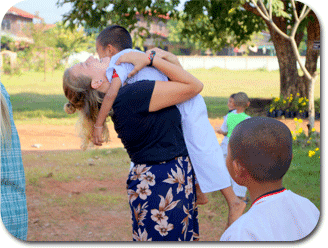
English lessons can be real fun!

Report 2023 – Teaching in the schools, by Katharina Fetz
I – a trained kindergarten teacher and music teacher – had the opportunity to teach children in schools in the surrounding villages in English and Music for four weeks.
My Impressions
The work of previous volunteers is clearly visible:
- The children can identify the letters of the English alphabet.
- When they see an English word in written form, they can spell it.
- They recognize both uppercase and lowercase letters, though small letters are still a little bit difficult for some kids.
- Their vocabulary covers basic terms like colors, animals, fruits, numbers, days of the week, etc.
- They can introduce themselves in simple language and ask for someone’s name or where they come from.
There is great potential:
- Most of the children are highly motivated to learn English.
- They appreciate it when you spend time with them and engage with them.
- Both the children and the teachers who teach English in schools are eager to learn the correct English pronunciation from us volunteers.
- As a music teacher, I was particularly impressed by the children’s musical abilities. They have an incredible sense of rhythm and are quick to learn various musical patterns, melodies, and dance moves. Singing is therefore a good way to practice English pronunciation, learn new vocabulary and internalize English phrases.
Challenges:
- During the Covid-19 pandemic, there was practically no school. Therefore, there is a lot of catching up to do in all subjects.
- Most volunteers stay for only a few weeks, what makes it challenging to plan progressive teaching. It's helpful to focus on one or two topics and explore them thoroughly with the children. This also gives the children the opportunity to revise and practice what they learned before new volunteers arrive and start something new.
- The available teaching materials vary greatly from school to school. Every school has a whiteboard and pens. Thanks to donations, the children also have notebooks and pens. In the larger schools, there are English textbooks (which are in most cases too advanced) and sometimes children’s books. At the V2T Camp, a variety of teaching materials has come together, including flashcards, simple games, grammar exercises, etc., which can all be taken to the schools for teaching. Working with images has proven to be very effective! Simple hand-drawn symbols suffice for the children to better learn new vocabulary.
- Spontaneity is very important! It is often unclear beforehand which class or age group will be taught, as schools' plans can change on short notice. It’s best to have a plan for various age groups to be able to respond quickly on-site.
- Especially in smaller, more isolated schools, it's not taken for granted that a teacher is always present due to a massive shortage of teachers. For these children, “school” doesn't mean the same as it does for children in countries with good educational systems. They often don’t even know why they go to school to learn and be prepared for the future. It’s not uncommon for the kids to do each other’s hair, lie down to sleep, or simply leave the classroom to play outside during the lesson.
If you accept all these facts and connect with each child based on their individual needs and current stage of development, you can have an unforgettable and joyful time at V2T, which can also help you personally in many ways. After all, what could be more beautiful than being greeted by the children with a big smile and a cheerful “Hello teacher!” as they eagerly wait to learn from you?

Report 2018 - Teaching in the schools, by Jurgen Verbist
I was a student in physical education and recreation movement teacher. I did my internship abroad at Volunt2Thai were I teached English and physical education at the schools and tempelschool.
Current status of students’ English learning
Some schools have a formal English class and an English teacher.
English level of the students:
- Basic English
- Students can read induvial letters and some word
- Students can recognize the alphabets
- Students spelling and reading is really basic
- Some students still need more attention because they heave learning disability or other problems
Students at all ages basically have similar English level, but some of them are more outstanding and know some more words and spellings.
Challenges for the volunteers:
- There are more volunteers needed with pedagogical background like teachers or internship from people who are studying for teacher.
- Teaching with basic learning materials.
- The volunteers created an safe environment for the children to try to speak English ( This needs more stimulance).
Sports:
After 14:00 on Tuesday and Thursday the children are free to practice some soccer, volleyball or other sports. There are no teachers with a lot of knowledge about sports and ways to teach the children to a better technique level.
The other problem is the weather. Sports need to be practice later in the day when it isn’t that hot anymore.
Needs:
- copy books- to practice writing letters and words
- single line exercise books
- plastic folders- for students to keep all the English worksheets or notes
- simple English phonic books, textbooks, and readers for all students, so everyone can follow the lessons better
- big posters with simple English vocabularies (e.g. Days of the week, body parts, colors, etc)
- Donations for the schools for better infrastructure
- Sport equipment (cones, balls, …)
Need to know for future internships:
- Challenge to teach
- Keep your mind focus on the basics
- Start from the beginning
- Try to communicate and learn some words Thai
- you get a lot of knowledge and kindness in return

Report 2015 - Teaching in the schools, by Jennifer Siu
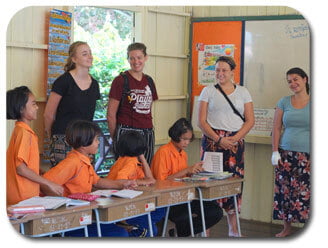
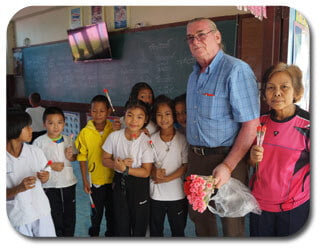
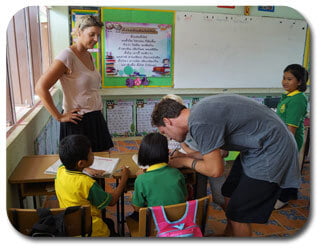
- Basically zero
- Most students cannot identify capital letters and small letters, nor recognize all alphabets
- some students can say some words but not spell nor read
- cannot understand all verbal instructions, demonstration needed
- some students might have learning disability, e.g. dysgraphia or problem with eye sight.
- Students at all ages basically have similar English level, but some of them are more outstanding and know some more words and spellings.
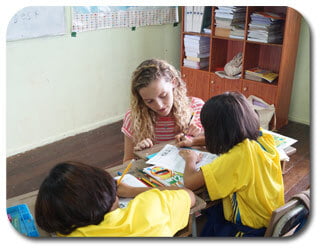
- Students do not have basic learning materials nor enough supplies for study
- There is basically no English teacher here. Local teachers speak very limited English or no English. If schools only rely on volunteers for English teaching, there will be a problem of continuation of student learning. (Update April 10, 2018: more local teachers speak English available now)
- There is lack of English speaking context. There are not many chances for students to speak, hear or practice English. Students are shy and not confident to speak English. (Update April 10, 2018: more volunteers now available)
Resources; available for students
- English phonic book (but not everyone has it because it is expensive)
- Single line exercise book and basic stationery (but not all of them can afford. Some of them run out of paper and have nothing to write on; some of them do not have erasers, correction pens or even pencils or pens and need to borrow from classmates)
Available at school
- Computer rooms with around 6 very old computers in Ban Nong Kung School
(computers are not used most of the time) - Wifi at classrooms
- Whiteboard with markers and erasers
- Printers
- A4 paper and general stationery
Needs
- copy books- to practice writing letters and words
- stationery- pencils, erasers, etc
- single line exercise books
- plastic folders- for students to keep all the English worksheets or notes
- simple English phonic books, textbooks, and readers for all students, so everyone can follow the lessons better
- big posters with simple English vocabularies (e.g. Days of the week, body parts, colors, etc)
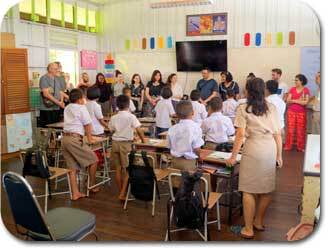
There are several suggestions for development in a long term.
Collect, design and compile more education materials like worksheets or simple English textbooks for education use.
Collect more donations for basic stationery and exercise books to make sure all students will have enough supplies for study.
Establish a small English library in school by collecting simple English books and readers.
Develop English course outline or a curriculum for whole academic year with different levels. So, volunteers can follow and keep students’ learning in progress
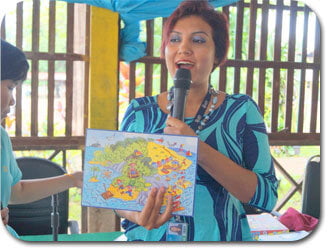
- Oral. Simple conversations which encourage students to speak English. It helps them communicating with volunteers and other foreigners in a certain extent and boosting their confidence.
- Read and write. Start from very basic like recognize alphabets, phonics and spelling of vocabularies
- Equip local teachers with English, so local teachers can sustain English classes at school in a certain extent in case there is no volunteer, or even take over English classes in a long term.
- Get clinical psychologists, school psychologists, child psychiatrists, educational psychologists or developmental psychologists involved to assess students if they have any learning disabilities. Afterwards, train the teachers and parents what can be done and how to improve the situation.
- Cooperate with department of optometry in universities or optical professionals to facilitate general eye check-up for students (and probably extent to all villagers) regularly. Refer those identify with eye problems to the clinics, and look for donations for those who need glasses. (Same concept can be used for health check-up programme)
